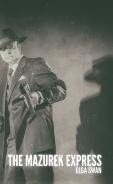“Rome, 1660
Rome was a pot-pourri of the centuries, tiny colourful fragments from the beginning of time heaped one fragrant layer upon another. It was old but so so beautiful, full of rainbow colour and elegance. There was no other way to describe it but a decayed sort of beauty.
The streets were narrow, the thoroughfares roughly hewn. And down the centre and along the sides, butting up sharply against the houses, ran open sewage channels where residents would tip their chamber pots every morning – and woe betide any unfortunate passer-by who happened to be walking below at that very moment.
At intervals along the street there were wooden posts strung out to separate the main carriage-way from the narrow space left for passing pedestrians. Each side of the street was an odd assortment of dwellings and shops, each leaning towards each other as if to embrace, their windows shuttered to keep out not just the heat but the dust and foul smells from the street below.
In a shop slap bang in the heart of the Rome commercial area, a young man was slowly dusting the shelves in a rhythmic, but dreamy fashion. His exertions caused a thick flick of black wavy hair to fall forward over his broad brow. In an unconscious gesture, he elegantly brushed back the wayward tendril to reveal clear olive skin.
After finishing the dusting, the boy whistled tunefully to himself as he willingly stacked yet another pile of spruce, willow and maple in the back storeroom, ready to be fashioned into beautiful musical instruments. Along the inner walls of the shop were already a small selection of guitars, violins, violas, cellos and a large harp resting in the corner.
The boy absolutely loved his work. He was yet only sixteen, but he could imagine no finer occupation in the whole world.
‘No, no, Antonio! Not like that!’ shouted Signor Amati, who had come down to Rome especially to supervise Antonio’s new venture. It was Signor Amati, or Nicolo as the boy called him, who had taught Antonio all he knew about making musical instruments. But it was always the violins which Antonio loved the best, a love which had blossomed ever since he first heard Signor Amati play.
Antonio’s dream was to set up in Nicolo’s home town of Cremona, but first he decided to move further south to Rome. ‘There are not enough rich people yet in Cremona. I want to make and sell violins, and where better than in the great city of Rome,’ he had cried to his mentor.
And Nicolo could only agree. The boy had ambition and undoubted skill, he had to admit. Never could he have imagined that someone so young could be so very talented. From the first time that Antonio had watched and then copied him as he fashioned the supple wood, it was clear that this was no ordinary boy.
This boy was a veritable maestro in the making......”


















No comments:
Post a Comment